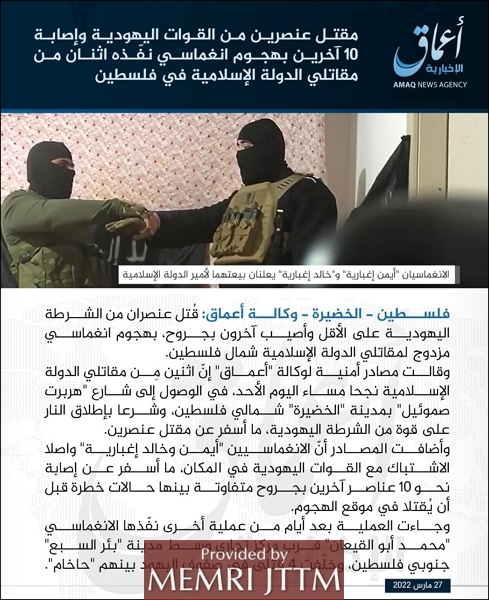The following report is now a complimentary offering from MEMRI's Jihad and Terrorism Threat Monitor (JTTM). For JTTM subscription information, click here.
On March 22, 2022, Muhammad Abu Al-Qi'an, a Bedouin citizen of Israel from the Negev region, carried out a car-ramming and stabbing attack in the southern Israeli city of Beersheba, killing four Israeli civilians. Abu Al-Qi'an had served a four-year sentence in an Israeli prison after attempting to travel to Syria to join the Islamic State (ISIS) and was released in 2019. Several days later, on March 27, 2022, two residents of the Arab-Israeli city of Umm Al-Fahm killed two Israeli border guards and injured twelve, including civilians, in a shooting attack in the northern Israeli city of Hadera, before being shot dead by undercover officers. Israeli media identified the two attackers as cousins, Ayman Ahmad Ighbariyeh and Ibrahim Hasan Ighbariyeh, and noted that Ibrahim was arrested in 2016 after travelling to Turkey, en route to joining ISIS in Syria, but was apprehended by Turkish police and sent back to Israel.
On March 27, ISIS claimed responsibility for the Hadera attack and identified the perpetrators as "two Islamic State fighters," in addition to posting a video showing the two cousins swearing allegiance to the new ISIS leader, Abu Al-Hasan Al-Hashemi Al-Qurashi, prior to the attack. The ISIS claim also noted that the attack occurred several days after the Beersheba one, which it credited to "the inghimasi Muhammad Abu Al-Qi'an," without stating explicitly that he had carried out the attack on behalf of ISIS. "The unbelieving Jews should know that our promises [to attack them] will reach them sooner or later, Allah willing," the statement threatened.[1]

Above is the A'maq claim for the Hadera attack, showing the two attackers swearing allegiance to ISIS leader Abu Al-Hasan Al-Hashemi Al-Qurashi prior to the attack.
This marks the first time ISIS has made a credible claim that perpetrators of an attack on Israeli soil had acted on behalf of ISIS.
The following series will summarize ISIS' position since its establishment on targeting Israel and the actions it has taken toward that end, based on material released by the organization's official media and reports of attacks perpetrated or planned by ISIS.
The report will be divided into five parts. The first part will provide a brief summary of ISIS' position on the Palestinian issue, from the organization's establishment to the present. The second and third parts will discuss the organization's ideological framework for the Palestinian issue in greater detail – the second one being devoted to ISIS' stance under the command of Abu Bakr Al-Baghdadi, between 2014 and 2019, and the third discussing an apparent focal shift under the command of Abu Ibrahim Al-Hashemi Al-Qurashi. The fourth part will discuss ISIS' position regarding the various Palestinian factions, and the fifth will address attacks on Israel and Israeli targets claimed by ISIS.
Summary Of ISIS' Position On The Palestinian Issue
Waging war on Israel and conquering Palestine[2] has never been an immediate objective for ISIS, although the organization has always asserted that doing so remains an eventual goal, after the elimination of the "apostate" Arab and Muslim regimes which rule the countries surrounding Israel. Furthermore, ISIS considers Palestine to be only one of many countries formerly under Islamic rule but which is now under the control of "unbelievers," given that the organization considers the rulers of every Muslim country to be apostates from Islam who must be fought. Predictably, ISIS strongly rejects the creation of a Palestinian state, as the organization opposes nationalism and the legitimacy of international borders, believing instead that all Muslim countries should join the international ISIS caliphate.
ISIS also does not have a "Palestine Province," although it maintains an official presence in many parts of the Middle East, including Syria, Iraq, the Sinai Peninsula, and Yemen. Although ISIS has claimed attacks against Israel, such operations have been sparse and on a small scale.
Much of the ISIS rhetoric threatening Israel, praising attacks against it, and encouraging supporters to perpetrate such attacks has been issued in reaction to actions against Israel initiated by rival groups, and as a defense against accusations made by opponents of ISIS that the organization ignores the plight of Palestinians and acquiesces to Jewish domination over Jerusalem and the rest of Palestine.
The organization's early leaders, Abu Bakr Al-Baghdadi and Abu Muhammad Al-'Adnani, mentioned Palestine very sparsely and never devoted speeches to the topic. Over time, there has been an escalation in ISIS rhetoric against Israel, although the organization has stressed that its ideological position concerning the struggle against Israel remains unchanged. A significant escalation in the organization's rhetoric threatening Israel occurred in January 2020, a few months after the appointment of ISIS' second leader, Abu Ibrahim Al-Hashemi Al-Qurashi, when the organization's spokesman declared that ISIS had begun a "new stage" in its war against "the Jews," calling on its operatives to target Israel and Israeli interests, and on Muslims everywhere to kill Jews wherever they encounter them.

The above banner announces the January 2020 speech by ISIS spokesman Abu Al-Hamzah Al-Qurashi, in which he declared a "new stage" in ISIS' war against "the Jews."
The uptick in ISIS rhetoric does not seem to have led to an increase in ISIS attacks against Israel and Israeli interests. It is likely that the increasing call to target Israel was due less to a focal shift by ISIS leadership than to a desire to demonstrate the organization's continued relevance despite the killing of its leaders, and efforts to attract new recruits by affirming support for the Palestinian cause. It also appears that loss of ISIS territory in Iraq and Syria led the organization to minimize its calls on Muslims to travel there, and to increase its focus on encouraging them to perpetrate "lone wolf" attacks in their home countries; this resulted in ISIS inciting Palestinians and Arab Israelis to attack inside Israel rather than joining ISIS in other countries.
In March 2022, soon after ISIS appointed its third leader, Abu Al-Hasan Al-Hashemi Al-Qurashi, two attacks were perpetrated inside Israel by Arab Israelis with ties to ISIS. The organization claimed one attack and gave the impression that the second was also perpetrated by an ISIS operative. This raises the question whether the organization has indeed modified its agenda and now sees masterminding attacks on Israel as a priority.
It is possible that ISIS has shifted its focus, perhaps due to the differing priorities of its new leader, and now sees masterminding attacks against Israel as a greater priority than it previously did. However, it is more likely that the perpetrators of these recent attacks acted on their own and that ISIS leadership is not facilitating operations against Israel, other than inciting to them periodically, generally when tensions are high between Israel and Palestinian factions. Thus, it seems probable that ISIS will continue its activity in its various "provinces," targeting government forces and rival militant groups in the Middle East, South Asia, and Sub-Saharan Africa, while attacks against Israel will remain at a minimum. At the same time, there are still ISIS supporters living in Israel and the Palestinian territories, who may decide, under the influence of ISIS propaganda, to instigate attacks in the name of the jihadi organization, which views Israelis and Jews as enemies whom it is meritorious to target, provided that the attack is carried out for the sake of Allah and not out of nationalistic motives.
[1] See MEMRI JTTM Report: ISIS Official Media Claims Responsibility For Terrorist Attack In Hadera, Israel, March 27, 2022.
[2] Throughout this report, the term Palestine is used as a geographic term - as it is used by jihadis - to refer to the territory governed by Israel, as well as the West Bank and Gaza, not as a political term referring to a Palestinian state or the areas governed by the Palestinian Authority.
The full text of this post is available to subscribers.
Please login or register to request subscription information from MEMRI








